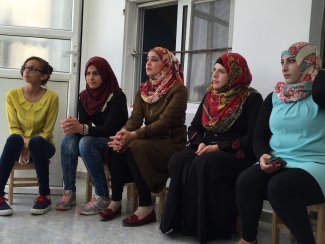
Despite a December 2021 ministerial decree that partially lifted a ban on Palestinian refugees working in union-regulated professions, Palestinians’ access to employment in Lebanon remains very limited. Young people from Palestinian communities often find themselves deprived of economic opportunities or forced to work informally. Pictured here, a young man works at a bakery in a Palestinian camp in Beirut, 18 February 2022.
“My job currently consists of looking for a job. I spend every day looking for companies who are hiring,” says Nour Shaheen, a 24-year-old Palestinian university graduate. Two years after finishing her Bachelor of Arts in Economics at Al-Quods Bard College in East Jerusalem, Nour is one of millions of young people in the Arab world who cannot find a job.
According to a 2022 report by the International Labour Organization (ILO), the Arab states “have the highest and the fastest growing unemployment rate of young people worldwide, projected at 24.8 per cent” for people aged between 15 and 24, compared with the global average of 15.6 per cent. Reflected in this figure is a much higher unemployment rate among young women (42.5 per cent).
“Young women continue to face serious obstacles in accessing decent and productive jobs when they do participate, driven by discriminatory practices, gender stereotypes and insufficient family-friendly policies. They bear the double burden of being both young and female,” Ruba Jaradat, ILO regional director for Arab States, tells Equal Times.
It is important to note that the unemployment rate for people between 15 and 24 and the conditions they face vary significantly from one country to another. While the figure was close to 40 per cent in Jordan and Palestine at the end of 2021, it was 14 per cent in Oman and only 0.5 per cent in Qatar.
With almost one in three people under the age of 15 and one in two under 30, and a population growing almost twice as fast as the rest of the world, unemployment in the Arab world is likely to accelerate and increasingly burden national economies.
According to a joint report by the ILO and the Economic and Social Commission for Western Asia (ESCWA), even before the pandemic, the region needed to create as many as 33.3 million new jobs by 2030 to bring the regional unemployment rate down to 5 per cent and absorb the large number of young people who will enter the labour market.
In addition to differences between countries and genders, employment rates generally tend to be higher among young people living in rural areas. For example, Nour was unable to find a job in her home village of Al-Eizariya (also known as Bethany) in the West Bank and had to rent a flat in the nearest city, Ramallah, to access job opportunities.
“I was depressed. I moved from my family home to find a job in the city. Even after I moved I couldn’t find anything. It’s very frustrating and disappointing. I feel like my only chance to find a job is to leave Palestine,” she tells Equal Times.
The ‘lockdown generation’ and the brain drain
Generally speaking, the problem of youth unemployment in Arab countries is not new. In addition to the lack of economic diversification and the high prevalence of informal work (over 60 per cent on average and up to 85 per cent among people under 25), critics often cite over-reliance on the public sector. In its report Jobs Undone – Reshaping the Role of Governments toward Markets and Workers in the Middle East and North Africa, the World Bank estimates that one in four workers in Jordan and Egypt, and almost half of all workers in Iraq, are employed by the public sector.
Socio-economic upheaval and the various conflicts in the region have also contributed to governments’ failure to implement policies aimed at creating stable and decent jobs for their youth populations. According to Rony Haddad, 26, who holds a degree in banking and finance from Antonine University in Lebanon, the severe economic crisis affecting Lebanon is the main obstacle preventing him from finding a job.
“I send my CV to recruiters almost every day but after a number of banks closed it has become very difficult to find work in my field. I’ve had to resort to looking for work in sectors that have nothing to do with what I studied,” he says.
The Covid-19 pandemic has also had a particularly devastating impact on young people. Businesses were forced to close and lay off employees and many students saw their education interrupted. The impact was threefold: on young people who already had a job, on students still in training and on university graduates looking for their first job.
As Jaradat explains, the disruptions to education that the ‘lockdown generation’ experienced have made it all the more difficult for them to access labour markets. In 2021, the youth unemployment rate was on average 3 percentage points higher than its pre-pandemic level in most Arab countries. According to figures provided to Equal Times by the ILO, the number of young people not in education, employment or training (NEETs) increased by 871,000 in 2020 compared to 2019. In total, more than 22 million young people under the age of 25 found themselves in this situation in the Middle East and North Africa in late 2021.
Nour is one of the students for whom the pandemic could have long-term consequences on employment access. “I graduated during the pandemic, at a time when people were losing their jobs. During an internship I did right after graduation, I saw half the employees laid off, including those who had been there for many years,” she tells Equal Times.
“There are fewer and fewer job opportunities and many of the people who are applying already have professional experience. This has resulted in particularly fierce competition to enter the labour market,” she explains.
Younger generations face a variety of challenges associated with the Covid-19 pandemic, including prolonged unemployment, persistent informal work and being forced into under-skilled and underpaid jobs.
According to Jaradat, as governments have failed to put reforms into place, the frustration of unemployed youthhas become a source of conflict and social instability that could potentially trigger popular uprisings similar to those experienced by various Arab countries over the past decade.
The inability of governments to provide stable employment to their youth populations has also resulted in an untapped source of talent and a significant brain drain. With no prospects for their future, as many as two-thirds of young Lebanese graduates in 2021 said they wanted to leave the country. The same year in Iraq and Jordan, almost half of young people between 18 and 29 stated their intention to emigrate abroad.
The creation of new jobs is the main concern for at least half of the population in the latter two countries. As Jaradat sees it, the inability of the region’s governments to meet the needs of their youth population risks turning the region’s demographic surplus into a curse.
The way forward: developing the private sector and improving training
Several international organisations, including the World Bank and the ILO, argue that countries in the region should focus on developing the private sector, which struggles to create stable and decent jobs and remains largely under-represented in employment statistics. Legal structures and competition policies continue to protect a few already well-established players (the public sector and large enterprises) to the detriment of medium and smaller enterprises. Several countries in the region, including Lebanon and Jordan, registered negative labour productivity growth this year.
Jaradat argues that governments need to do more to address the mismatch between the skills being taught in higher education and those needed in the labour market to smooth graduates’ transition into employment. Despite increased investment in education in recent years, vocational training has failed to equip graduates with the right skills for the labour market.
Many students are still being trained for jobs in already completely saturated public sector. Furthermore, according to the World Bank, while the region has managed to shed ‘low-skilled’ jobs over the past two decades, it has not been able to compensate for them with so-called ‘high-skilled’ jobs.
This has left the region with a surplus of students with skills associated with administrative, service, sales and craft occupations, while the labour market is looking for specialised skills associated with managerial and engineering positions.
Young people seeking employment are well-aware of the major problem that lack of work experience and skills presents. “After finishing my studies, I still had no work experience in my field. Nobody will hire me without at least one year of work experience,” says Rony. “Every university should work with companies or any other field related to the main subject students are studying to help us gain experience,” he says.
In an effort to correct these problems, some countries in the region have already taken initiatives to address youth unemployment. In May 2022, no less than 18 Arab states met in Amman, Jordan, to discuss a broad range of issues including apprenticeships, qualifications, social inclusion and professional transition for young workers. Among the key measures discussed were ways to encourage collaboration between ministries and the private sector, and to provide internships and apprenticeships to young people as a way to gain work experience.












